After our visit to the floating islands, our group motored toward Amantani Island, where we broke into smaller groups for an overnight stay in the village of Colquecachi. Our “smaller group” was my husband and me. We stayed with a woman named Aurelia and her teenage son, Evan. They were wonderful hosts. Aurelia didn’t speak any English, and neither did Evan. Aurelia spoke Quechua and a handful of Spanish words (like amigo), while Evan spoke Quechua and some Spanish. My Liege had his trusty Latin American Spanish phrasebook out all the time, and we also had a cheat sheet of Quechua words that our guide Tito had taught us during the motorboat ride. Without this cheat sheet, we would have been lost.
I was nervous going into the homestay. We didn’t know if we would be assigned to a family that had done this hundreds of times or a first-time family. Later, we learned that some families had several members, whereas ours had just the two (Aurelia’s husband works in Puno). Some families have mosaic stonework in their courtyards, and we even heard of a family with a guestbook for the guests to sign. Some might have a little propane stove in the kitchen, which is essentially housed in a separate building. Others just cook over a fire. Aurelia cooked over a fire.

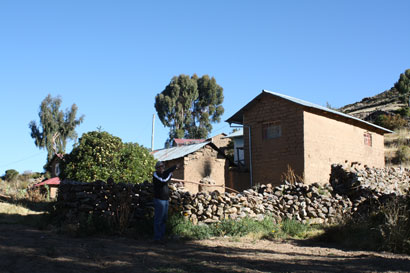
We asked and were told that the room under our bedroom contained “nothing.” Which meant it might have been used for storage or was inhospitable. Our room had a steel door that separated it from Aurelia’s room, which was on the top floor of the little bit of blue you can see sticking out to the left of the rectangular building.
Evan lived on the ground floor underneath Aurelia’s room. He had roots and vegetables drying in his room. Vegetables were also drying in the courtyard.
The little building in the front, by the bush, was the kitchen. A gate contained the house and courtyard. Water came from a pump outside the courtyard. That was where we washed up. No showers, no hot water—unless you boil it.
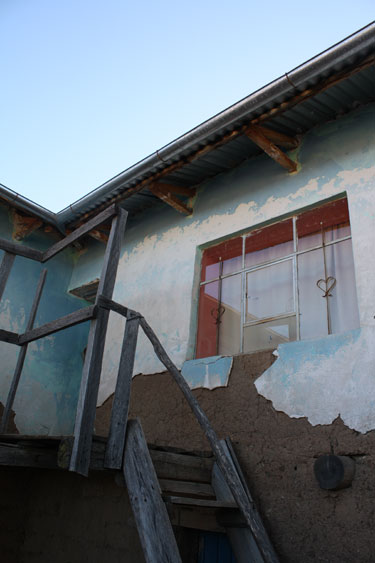
You can see that at one time the adobe (mud) walls were covered with stucco. Most of the stucco and paint had chipped and worn off our host house. The courtyard had about 90% earth floor.
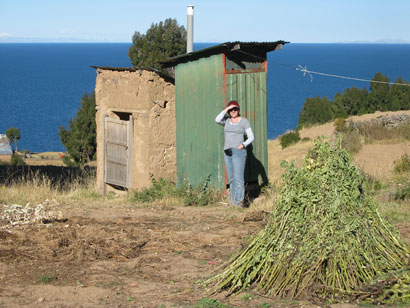
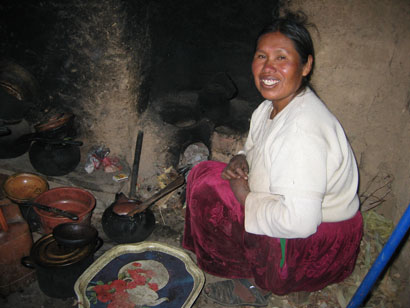
Aurelia’s “cupboards” were a pile of pots and dishes to the left of this picture. At one point, Steve examined the platter you can see on the floor beside Aurelia. But he didn’t put it back in the right place! He sure heard about that. Everything had its place. With such a confined space, it had to.
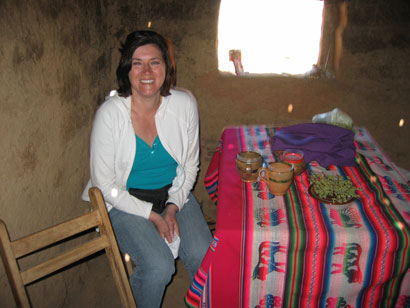
Our guide Tito had warned us that the doorways to the kitchens were very short and likely used the corrugated iron. Such was the case at Aurelia’s house. We were warned not to forget to duck! Well, Steve went outside with Evan at some point to try and figure out some point of language, forgot to duck, and gashed his head on the doorway. For some reason, Evan, Aurelia and myself all thought this was hilarious. Meanwhile, Steve had blood rolling down his head. That’s what you get, gringo! Listen to instructions!
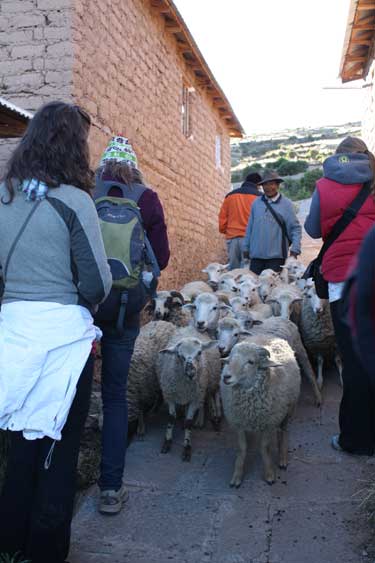
When Steve and I were first assigned to Aurelia’s house and realized it was about level with the meeting spot, we considered ourselves lucky. We didn’t have to hike up to our house! But we had to hike up to the community center, and, let me tell you, it was exhausting. We stopped to catch our breath on Lake Titicaca more than at any other place in Peru. And we weren’t the only ones. We met a mid-sixties couple from New Zealand who had hiked the Inca Trail with less effort than they expended on Lake Titicaca. They hiked to the community center but opted out of hiking to the top of the island to watch the sunset.
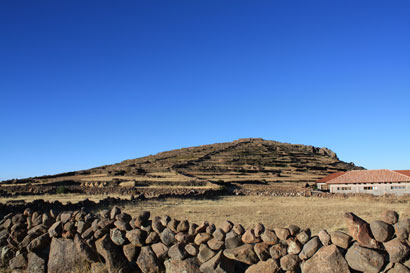
It was a long hike! At this point, M.L. and I were easily the oldest people in our group hiking to the top. That was our excuse for all our rest stops.

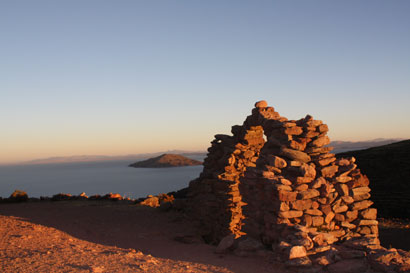
The hosting families had a set menu to offer. Steve and I basically ate what everyone else in our group was eating. Which was, essentially, a rehash of what we had at lunch. Not much time had passed between lunch and dinner, so we weren’t very hungry. Our hosts wanted to make sure we were full, so Aurelia made way too much. We ate as much as we could, but our little North American stomachs weren’t used to the starch-heavy meals.
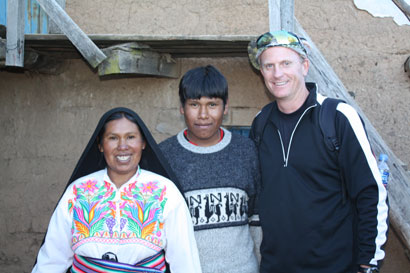
After dinner, we were allowed time to rest. Then Aurelia showed up with some of her clothes for me to put on and some of her husband’s clothes for Steve to wear. Dressed in traditional clothing, we hiked up to the community center again! This time for a party. Dancing and drinking ensued. The villagers really get into the dancing, and at some point if you’re not finding yourself dragged around the floor in a huge group that feels like a twisting, twining snake, you’re missing all the fun.
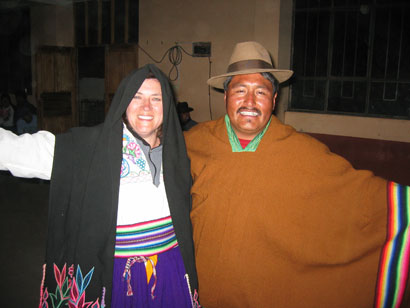
Between all the hiking and dancing, we were once more exhausted. I’m convinced it’s impossible to rest in Peru. At least not during a Lake Titicaca homestay. They kept us running.
Eventually we made our way back down to Aurelia’s house. We knew the community hall was a fair hike when she wanted to stop to catch her breath almost as often as we did.
We went to bed early and rose to watch the sunrise. It was very cold. Remember I said no electricity. We brushed our teeth by the water pump outside the courtyard and went to bed wearing clothes and topped with 4 or 5 blankets.
The next morning, Day 20, Aurelia made us thin, crepe-like pancakes, then Evan accompanied us (downhill this time) to the boat and stayed with us until Tito arrived. We were the first guests back to the boat!
Meeting Aurelia and Evan was a once-in-a-lifetime experience. Evan and Steve hit it off, Steve, as you know by now, not being afraid to make a fool of himself trying to communicate.
Eventually, the rest of our group arrived and we set off for our last stop on Lake Titicaca, Taquile Island. Our 25th anniversary journey to Peru was rapidly coming to an end, which filled us with joy in some aspsects (we couldn’t wait to taste American food again—and salad!!) and with sadness in others. Soon, we wouldn’t have experiences, only memories. But memories that will last us the rest of our lives. Which is the joy of travel.